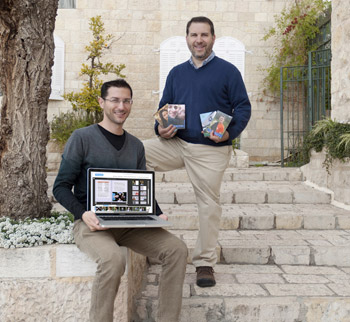Chances are when you rummage through that drawer looking for the benching booklet you picked up at a simchah – the one next to the drawer with all the souvenir kippot – you’ll find a suitable pamphlet with which to say your post-meal grace.
Nothing wrong with that – it’s the gift that keeps on giving. But a couple of entrepreneurial “bencher capitalists” had an idea to take the benching book to another level. Toronto-native Yitz Woolf and former Bostonian Daniel Laufer, who both made aliyah, have started a business called Let’s Bench that provides personalized benching books you can decorate as you see fit.
Printed in Israel and shipped around the world, the benching books combine ancient tradition and cutting-edge technology. They can contain pretty much any decorative, personalized photographs you choose. You can also add stock images of Judaica, scenes of Israel or additional texts. The benching books are perfect for making life cycle events, like bar or bat mitzvahs, weddings, anniversaries or even organizational dinners, that much more memorable, they say.
Customers can visit Let’s Bench’s website and choose from a variety of nusachim – styles or customs communities employ when saying grace. So far, an “egalitarian version,” which includes the matriarchs in the prayers, along with “Ashkenazi regular” have proven the most popular.
Using a simple app, customers upload their own photos and choose where in the benching book template they will place the pictures. Orders are placed online and the books are printed in Israel, where Let’s Bench can assure quality control and monitor their production.
Let’s Bench priced alternative printing sites, including China and the United States, but Israel came out ahead in price and quality. “Plus, a lot of Jewish people like to support Israel. But the main thing is quality control – we check the binding, the cropping [picture sizing],” Woolf said.
Since it was launched, Let’s Bench has filled around 60 orders, each averaging 100 to 150 booklets. The largest was for 300 benching books for a wedding celebration. Orders have come in from Canada, the United States, England and Israel.
A typical Let’s Bench order came for a wedding that united a woman from Toronto and a man from Tel Aviv. “They found our site online when they were looking for a Conservative rabbi to officiate. Our ad popped up,” Woolf said. They included photos of themselves, their parents, pictures of Toronto and Israel, along with Jewish-themed objects like a challah and kiddush cups.
Another benching booklet, produced for a 50th anniversary party, featured photos of the couple along with pictures of their children, grandchildren and great-grandchildren. It was a great souvenir of the event, Woolf said, adding benching books are used repeatedly, reminding people of the simchah in the years to come.
Woolf, 37, and Laufer launched Let’s Bench around Chanukah last year. “It was a soft launch without much publicity,” Woolf said. Because the booklets are sold online and rely on code developed in Israel, it was important to work out any bugs before ramping up a publicity campaign, he added.
To date, the venture has proven to be a break-even proposition – if you account only for the out-of-pocket costs. Each contributed $5,000 towards the venture, but Woolf said that doesn’t include the value of the time they invested.
A graphic designer, photographer and Internet maven by profession, Woolf designed the project’s templates, found its content and generally oversaw the artistic aspect of the project. Laufer handled the business aspects of the venture, including financing, printing, shipping and accounting.
Woolf acknowledged that Let’s Bench can’t support two people at this time. He continues his other ventures –photographing simchahs, working in graphic design, creating websites.
“We’re hoping we can build this into a full-time business,” he said. “We hope to add some more products to our [inventory].”
Prior to hooking up with Laufer, Woolf had been looking to start a new business. One day, out of the blue, he received a call from Laufer who suggested they collaborate on the benching venture. Woolf jumped at the opportunity. He had been considering his own business modifying traditional benching books, but only to change their look and style. He quickly recognized that Laufer’s idea of personalizing them with photos took his idea to the next level and meshed nicely with his own concepts. “It was a perfect fit,” he said.
Laufer, who made aliyah in 1989, had heard of Woolf through mutual friends at the Shira Hadasha synagogue in the German Colony section of Jerusalem. Woolf made aliyah seven years ago after obtaining a degree in marketing and business management. He had been working as a freelance graphic designer in Toronto and realized his skills were portable – he could ply his trade anywhere around the world.
An alumnus of Eitz Chaim Day School in Toronto, Woolf already had a sister living in Israel, and his parents visited there four times a year.
Encouraged also by the Nefesh B’Nefesh program, which promotes aliyah, and discouraged by the Toronto winters, he made the move.
“It’s a different lifestyle,” he conceded, but he has lots of friends there and it’s a move he does not regret.
